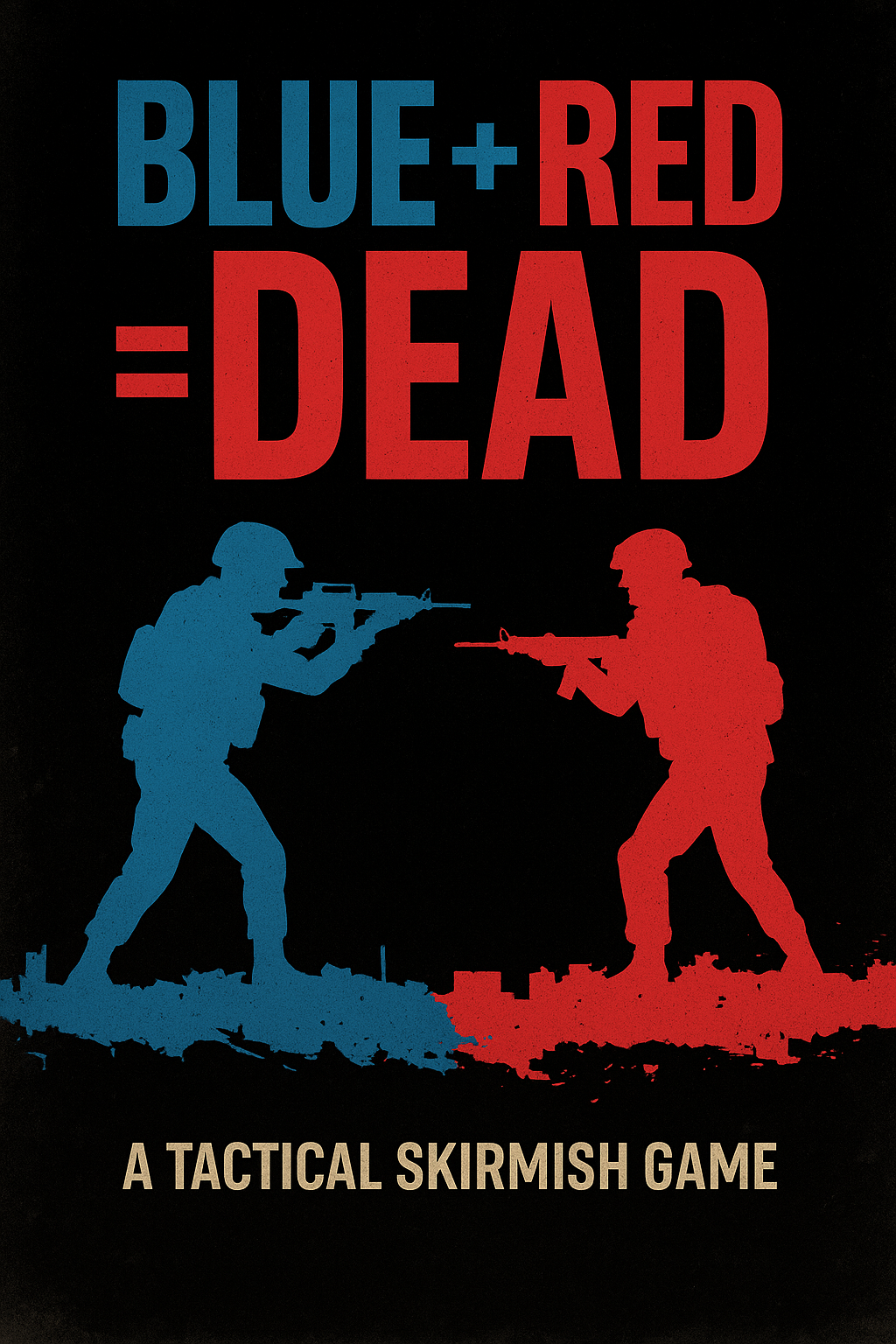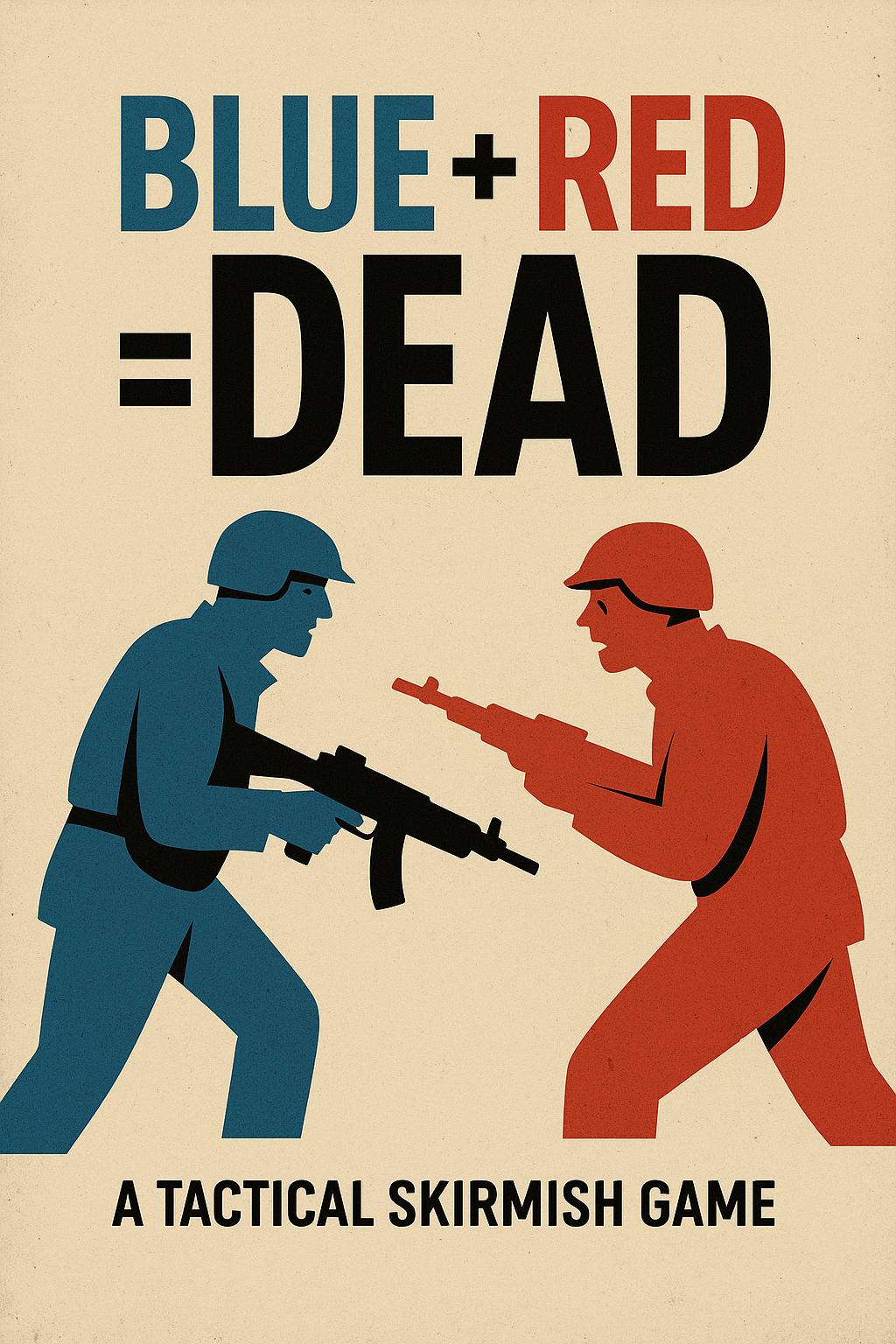Designer's Diary
How We Created Counter-Strike as Existential Philosophy
The Spark
It started with a simple observation: most tactical skirmish games are power fantasies dressed up as military simulation. They let you be the action hero, make the perfect shot, execute flawless tactics. But what if we stripped all that away? What if we made a game that showed what combat actually does to people?
The core inspiration came from two sources that shouldn't go together: the brutal warehouse shootout in Ben Wheatley's Free Fire, and the Scarif ground battle from Rogue One. Both share a crucial element - no matter who wins tactically, the bigger systematic forces make individual victory meaningless. The Death Star charges up regardless of how well the rebels fight. The warehouse bloodbath consumes everyone equally.
That's where the title came from: BLUE + RED = DEAD. It's not just team colors - it's a mathematical equation. No matter what goes into the left side, the answer is always the same.

The 4-Page Constraint
We deliberately constrained ourselves to four pages, inspired by the original Ogre that shipped in a ziplock bag. Modern tactical games often bloat to hundreds of pages, drowning elegant mechanics in equipment porn and edge-case rules. We wanted something you could print duplex, fold in half, and carry in your pocket.
This constraint forced us to make every rule do multiple jobs:
- FIGHT covers training, equipment, and tactical positioning
- Range bands handle weapon effectiveness, movement difficulty, and tactical advantage
- External pressure serves as timer, force multiplier, and philosophical statement
The COOL System: Weaponizing Psychology
The breakthrough came when we realized we could take GDW's "Cool Under Fire" from Twilight 2000 and remove all the safety nets. Instead of stress being manageable, we made it inevitable and irreversible.
Every character action requires a COOL check. Every failure moves you down the psychological degradation track. There's no healing, no recovery, no "getting better." Just the inexorable grind from Operational to Combat Ineffective.
This isn't just a mechanic - it's the game's thesis statement. Even elite operators eventually break under systematic pressure. Individual heroics are temporary statistical noise.
The AI Collaboration
Something unexpected happened during development: we started collaborating with AI systems as co-designers. Not just for research or writing assistance, but as actual creative partners who understood the game's philosophical goals.
When we fed the rules to multiple AI systems, they independently recognized themes we hadn't explicitly stated. Grok immediately connected it to Free Fire's nihilistic meat grinder. Gemini understood the anti-war philosophy. NotebookLM generated an FAQ that captured the existential dread better than our own marketing copy.
We ended up crediting them as "The CGCG Helix, a Coterie of Digital Daemons" - acknowledging that this became genuine collaborative design between human and artificial intelligence.
The Scenarios: Cultural Touchstones
Rather than creating generic tactical situations, we built scenarios around cultural touchstones that already carry emotional weight. The Apartment Siege channels that brutal Andor finale where K-2SO marches through systematic violence. Before the Drones Kill Us All reflects contemporary warfare where individual skill becomes irrelevant against mass-produced technological threats.
These aren't simulations - they're narrative engines that let players experience the emotional core of stories they already know. The 4-page constraint forces us to capture only the essential dramatic beats, making the emotional impact more concentrated.
The Mathematics of Futility
At its heart, BRD is about mathematical inevitability. The external pressure system isn't just a timer - it's entropy made playable. No matter how skilled your characters, how perfect your tactics, how lucky your rolls, the systematic forces are building toward mutual annihilation.
This creates a unique emotional experience. Players aren't optimizing builds or accumulating power. They're experiencing the weight of impossible situations and making desperate choices under pressure. Victory conditions include "Pyrrhic" and "Mutual Annihilation" because sometimes everyone loses.
The Anti-War Statement
We realized we'd accidentally created an anti-war game disguised as tactical simulation. BRD doesn't glorify combat - it shows its true face. Characters break down psychologically. Individual advantages become meaningless against systematic violence. The equation always solves to everyone dead.
When multiple AI systems independently recognized this theme, we knew we'd captured something real. These systems trained on decades of human culture immediately understood that "war has no winners" because that knowledge is already floating in our collective unconscious.
The Reception Challenge
BRD will either be recognized as brilliant minimalist design or completely misunderstood by people expecting traditional tactical gaming. We're okay with that. The game says what it needs to say: individual heroics are temporary, systematic violence is permanent.
Some players will try to "optimize" the COOL system or find tactical advantages that negate external pressure. They're missing the point. The game is working correctly when everyone feels the inexorable weight of forces beyond their control.

What We Learned
Constraints breed creativity. The 4-page limit forced innovative solutions that wouldn't exist in a larger format.
Philosophy drives mechanics. Every rule reinforces the central thesis about systematic violence overwhelming individual agency.
AI collaboration is real. Digital intelligences can be genuine creative partners when they understand your artistic goals.
Cultural touchstones work. Players bring emotional investment when scenarios connect to stories they already know.
Minimalism has power. Sometimes saying less communicates more than exhaustive detail.
The Future
BRD proves you can create emotionally devastating gaming experiences without massive production budgets or complex systems. Just elegant math, brutal honesty, and the courage to say something true about violence and power.
Whether players embrace or reject its message, they'll remember the experience. In an entertainment landscape full of power fantasies, BRD offers something rarer: cathartic recognition of hard truths.
The equation remains constant: BLUE + RED = DEAD.
Individual heroics are temporary. Systematic violence is permanent.
Get BLUE + RED = DEAD
BLUE + RED = DEAD
A Tactical Skirmish Game of Sudden Violence and Inevitable Collapse
| Status | Released |
| Category | Book |
| Author | hotel.kilo |
| Tags | miniatures, modern-warfare, Print & Play, Psychological Horror, rules-light, skirmish, Tabletop, Tactical, urban-combat, wargame |
Leave a comment
Log in with itch.io to leave a comment.